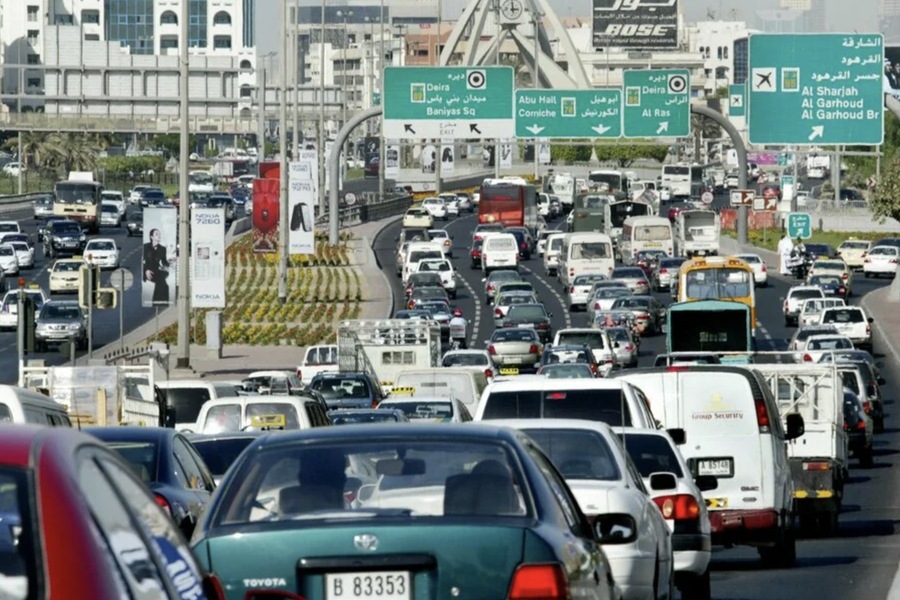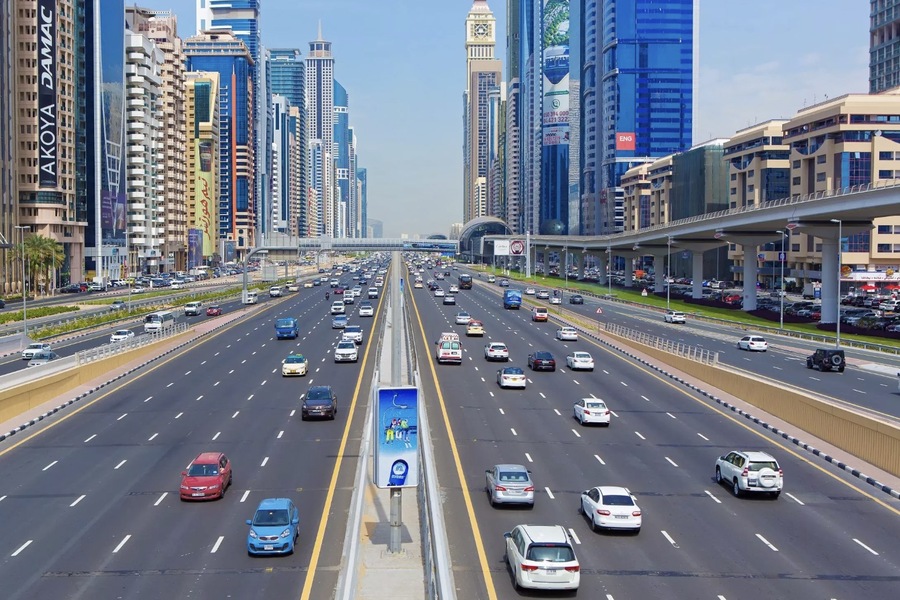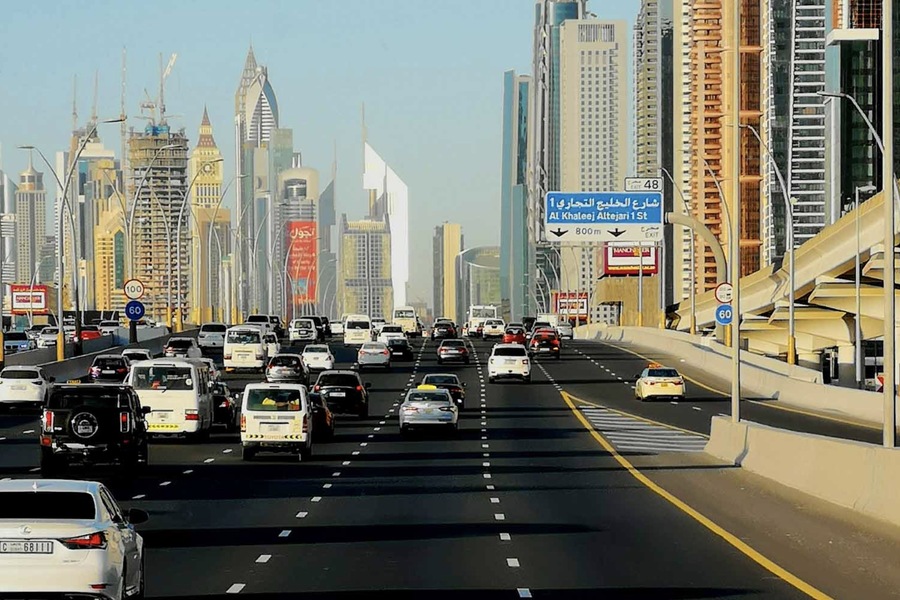Dubai captivates millions of travelers worldwide with its iconic skyline, luxury lifestyle, and unparalleled sense of modernity. But when it comes to driving on Dubai’s roads, the experience can be both thrilling and challenging. With its state-of-the-art infrastructure, Dubai is made for smooth driving, yet the rules and regulations are often strict, with high standards of enforcement. If you’re considering renting a car to explore the city but want to avoid the complexities of navigating alone, consider Zofeur for a car and driver on demand. Here’s an in-depth guide to the “rules of the road” in Dubai, ensuring you’re prepared for a smooth, safe driving experience.
Basic Driving Orientation in Dubai: Right-Hand Driving and Navigation Tips
In Dubai, driving takes place on the right side of the road, similar to North America and much of Europe. This is familiar for many international tourists but can still be challenging due to Dubai’s unique road layouts and complex networks of interchanges, especially for those unfamiliar with its extensive use of roundabouts and multi-lane highways.
To avoid confusion
Utilize Navigation Apps: GPS apps such as Google Maps or specialized local apps like Waze are indispensable. Since Dubai’s roads are well-maintained but full of intersections and junctions, a real-time map can help prevent wrong turns.
Understanding Roundabouts: At roundabouts, which are numerous, the rule is to yield to those already circulating within the roundabout. Remember that those inside the circle have the right of way. It may take a few turns to get used to, so approach with caution and confidence.

Dubai’s Speed Limits: Strict Enforcement and Common Limits
Dubai enforces speed limits strictly, with various limits based on whether you’re driving within the city, on highways, or in residential areas. Here’s a breakdown:
City Limits: The speed limit is typically 60 km/h in populated areas and business districts.
Highways and Outside City Limits: On highways or expressways, the speed limit can range from 100 to 120 km/h, depending on the location.
Residential and School Zones: In residential neighborhoods or near schools, the speed limit is usually lower (between 30 to 40 km/h), with signposts indicating the specific limits.
It’s crucial to remember that Dubai’s roads are monitored by numerous speed cameras and radar systems. This surveillance extends to both speed and road behavior, meaning even minor violations, such as tailgating, can be detected and fined. In some cases, radar cameras capture and fine motorists automatically without a physical police presence, so it’s best to stay mindful of all posted limits.
Penalties for Speeding and Driving Violations
Dubai’s traffic authorities take road safety seriously, and as such, speeding fines are substantial. Here’s an outline of how speeding violations are managed:
Automatic Fines: Speed cameras and radar systems issue fines automatically when limits are exceeded.
Fine Structure: Fines vary according to the degree of speeding. Minor speeding offenses might incur lower fines, but excessive speeding can result in high penalties or even temporary impoundment of the vehicle.
Black Points: Dubai’s black point system assigns demerit points for each violation, leading to license suspension or higher penalties if the point threshold is reached.
In addition, Dubai’s traffic authorities enforce fines for various behaviors, including running red lights, reckless driving, and using a mobile phone without a hands-free device. Note that the fines can be steep, reaching into the thousands of dirhams for severe violations.
Traffic Etiquette: Road Courtesy and Local Driving Culture
Dubai’s roads are generally populated by a mix of seasoned residents and international tourists. While tourists may find the driving culture less accommodating compared to countries known for a relaxed driving style, it’s essential to understand and respect the local etiquette:
Overtaking and Merging: While overtaking is allowed, use the left lane for this purpose only. It’s also worth noting that many drivers use indicators sparingly, so it’s best to stay alert, especially when merging onto highways.
Giving Way: Local drivers are accustomed to quick reactions, so try to avoid hesitations when merging into lanes or making turns, as this can confuse drivers behind you. However, don’t expect frequent gestures or signals of acknowledgment from other drivers.
In Case of Honking: Honking is not commonly used in Dubai, and excessive honking could be interpreted as aggressive behavior. Instead, remain calm and patient, especially in situations where traffic seems to be at a standstill.
Paid Parking System in Dubai: How It Works
Parking in Dubai is convenient yet predominantly paid. Most parking areas charge on an hourly basis, and there are certain times of day when free parking is available:
Hourly Payment: Dubai’s parking system works similarly to other large cities, with an hourly rate for most public spaces. Parking machines are typically available, and payments can also be made through apps.
Parking Tickets: After paying for parking, drivers are issued a ticket that must be displayed on the dashboard. Ensure your parking is covered for the full duration of your stay; if not, fines or vehicle towing may occur.
If your car is towed, you can contact the police by dialing 999 to inquire about the location of the impounded vehicle. Reclaiming the vehicle will involve paying a fine of 50–75 AED, depending on the reason for towing. To avoid this hassle, be diligent about where and when you park.
Emergency Situations: What to Do in Case of an Accident
Dubai has a relatively low accident rate due to its high driving standards and strict laws. However, if you’re involved in an accident, follow these steps:
Do Not Move the Vehicles: Unless the vehicles pose a risk to other road users, do not move them. Instead, call the Dubai Police emergency number (999).
Police Report: Wait for a police officer to arrive and file a report. The police will document the incident and assign fault, which is crucial for insurance purposes. This report is essential and will be required by rental companies or insurance providers.
Insurance Protocol: Dubai’s insurance companies require a police report for all claims. This means it’s mandatory to report even minor accidents, as failing to do so may nullify your insurance coverage.
If there are injuries involved, the severity of the consequences for the at-fault driver increases significantly. Dubai’s laws regarding injury in accidents are strict, and those responsible may face heavy fines or imprisonment, depending on the situation’s gravity.
Legal Requirements: International Driving Permit (IDP) and Licensing
One of the most important requirements for tourists planning to drive in Dubai is an International Driving Permit (IDP). Here’s what you need to know:
IDP Required: Tourists need an IDP along with a valid license from their home country to rent or drive a car in Dubai. If caught driving without an IDP, the individual faces penalties, including possible jail time for up to six months.
License Validation: When renting a luxury car, some rental companies may require additional documents and may ask for driving experience verification. Be prepared for these checks if you’re considering a high-performance vehicle.

Avoiding Traffic Jams: Choosing the Best Driving Times
Fortunately, Dubai is designed to prevent severe congestion, especially compared to other major cities. But some areas can experience traffic slowdowns, particularly during rush hours. To avoid traffic jams:
Plan Around Peak Times: Dubai’s peak traffic hours are usually from 7:00 AM to 9:00 AM and 5:00 PM to 8:00 PM.
Flexible Navigation: If you encounter traffic, Dubai’s road design allows flexibility; simply look for alternative routes through one of the city’s numerous intersections.
Dubai’s city planning also enables smooth traffic flow, and tourists can rely on the city’s extensive navigation network to find alternative routes when necessary.
Car Rentals in Dubai: Is Self-Driving Worth It?
Renting a car offers freedom, but if you prefer not to navigate Dubai’s driving landscape, services like Zofeur provide an attractive alternative, allowing tourists to hire a driver on a pay-per-minute basis. This service is especially useful for travelers who want to enjoy Dubai’s sites without the added stress of adhering to road rules or navigating complex intersections.
Final Tips for Safe Driving in Dubai
- Observe Speed Limits
With a dense network of cameras, even minor speed violations are caught and fined, so always stay within limits. - Understand the Signs
Dubai’s signs are dual-labeled in Arabic and English, but knowing the primary symbols helps, especially in high-speed areas. - Respect the Black Points System
Dubai’s black points system can lead to a suspended license. For tourists, accruing black points may affect future rental options or lead to higher fines. - Get Familiar with Apps
Apps like Google Maps or even dedicated Dubai driving apps help with navigation and inform you about potential speed cameras. - Follow Local Customs
Driving in Dubai requires alertness and respect for local road practices. Avoid erratic lane changes, follow roundabout etiquette, and keep a safe distance from other vehicles.
Driving in Dubai can be a rewarding way to experience the city, but it demands full adherence to the rules and regulations. Follow these tips, stay vigilant, and make sure to familiarize yourself with the local driving culture. Dubai’s streets are some of the best in the world, and with a little preparation, you can enjoy a smooth, safe journey through this vibrant city.

I have acted as a financial expert on the Today Show and Good Morning, America. I like to give reasonable advice on budgeting to people with any income level.
